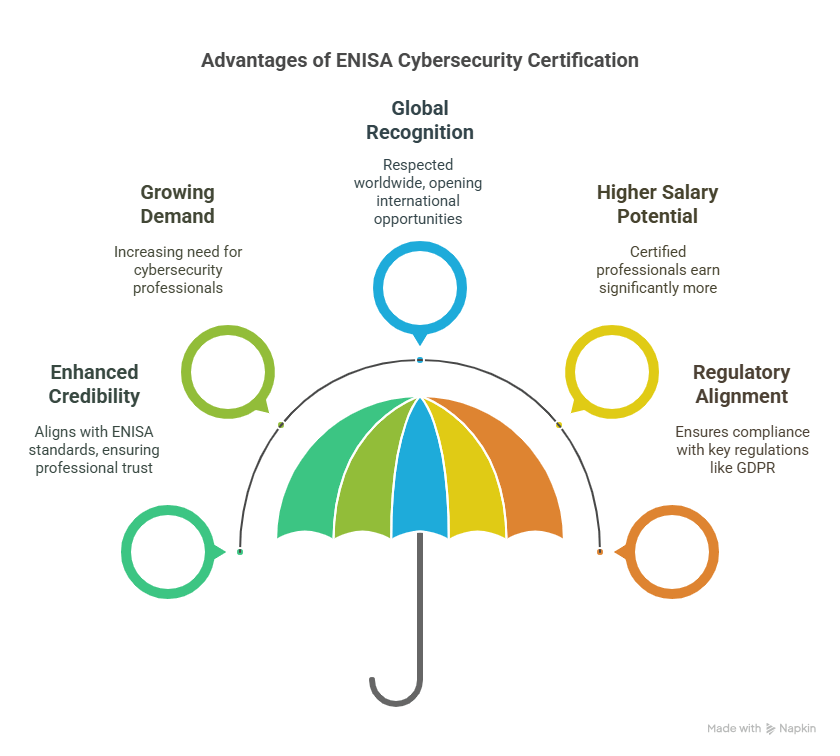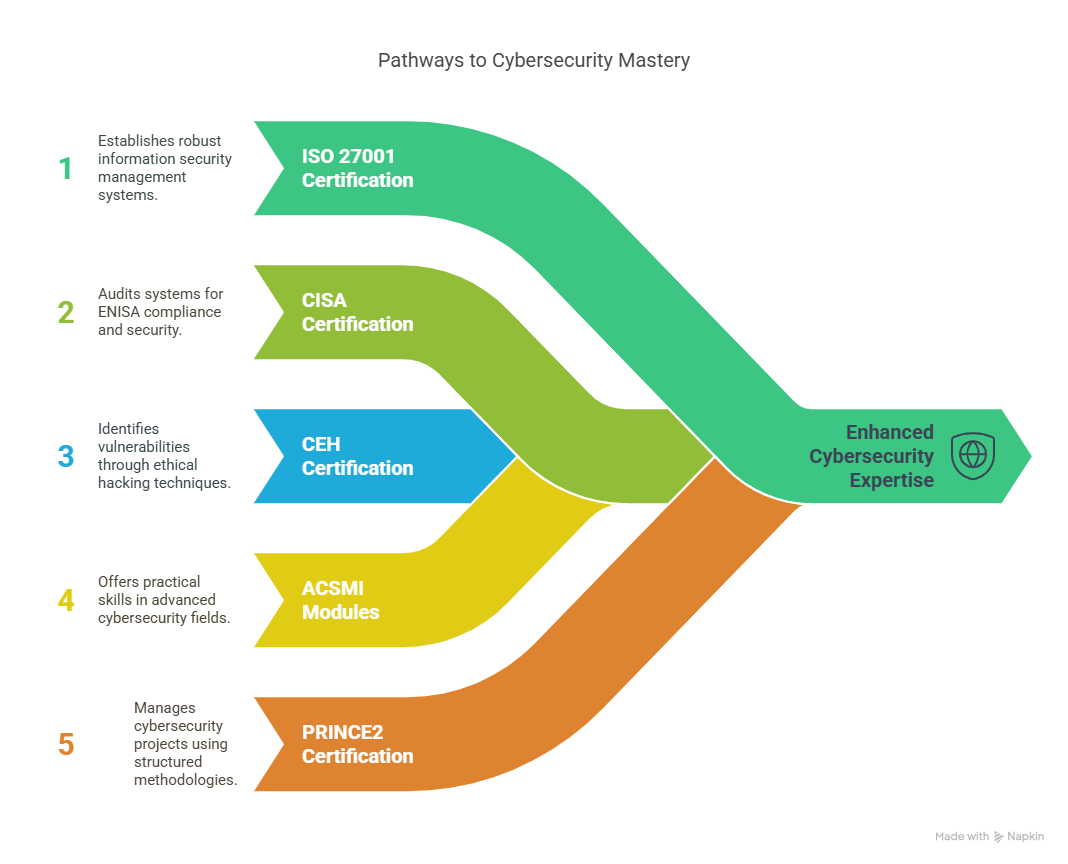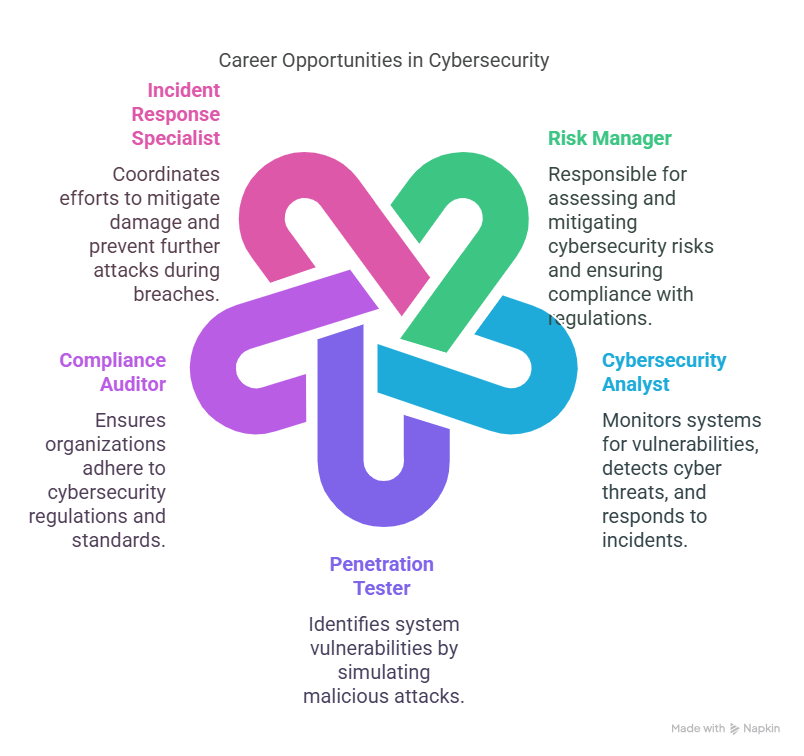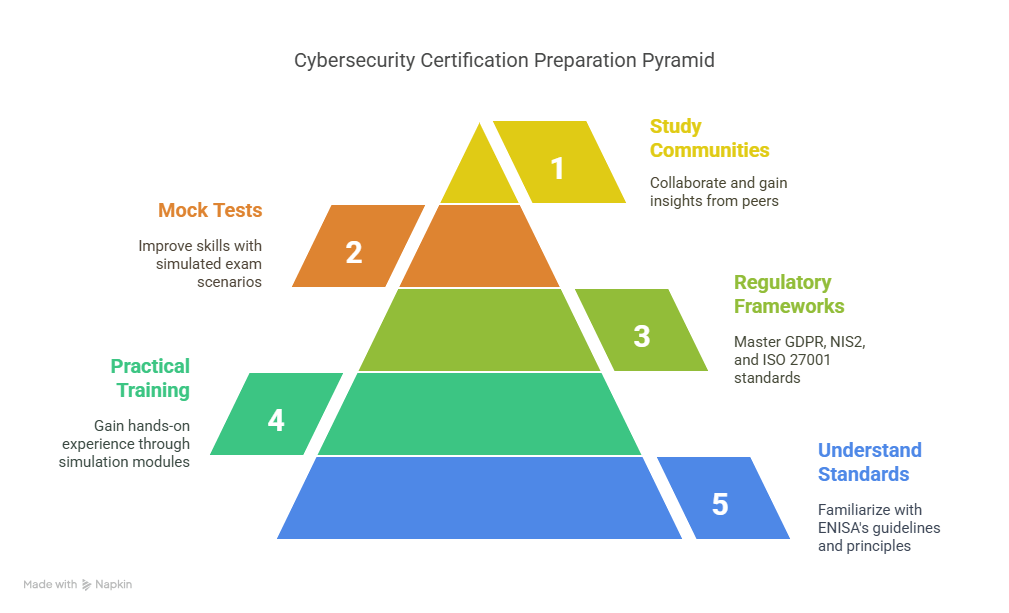Table of Contents
As the digital landscape evolves and cybersecurity threats continue to rise, the need for skilled professionals is greater than ever. The European Union Agency for Cybersecurity (ENISA) plays a central role in shaping the cybersecurity field across Europe. Through its frameworks, policies, and certifications, ENISA empowers professionals to tackle cybersecurity challenges while meeting European regulations. For those pursuing a career in cybersecurity, a Cybersecurity Certification ENISA is a significant asset, providing credibility, global recognition, and enhanced career opportunities. Whether you are preparing for a Cybersecurity Certification Test or exploring ENISA-endorsed programs, this guide will help you understand the role of ENISA in cybersecurity, the certifications it influences, and how you can leverage these certifications to accelerate your career.
What Is ENISA and Its Role in Cybersecurity?
The European Union Agency for Cybersecurity (ENISA) was established in 2004 to strengthen the EU’s cybersecurity posture by providing expertise, support, and guidance on all things related to cybersecurity. ENISA operates under the umbrella of the EU and works with public and private organizations to enhance cyber resilience across Europe. It provides essential resources like best practice frameworks, guidelines, and regulations that help European organizations manage cybersecurity risks and protect critical infrastructure.
ENISA's role is crucial for aligning cybersecurity policies across the EU, and while the agency does not directly issue certifications, its frameworks heavily influence various cybersecurity certification programs. These frameworks provide clear guidelines for developing certifications that align with EU cybersecurity directives, such as the EU Cybersecurity Act and the NIS2 Directive. By earning certifications aligned with ENISA frameworks, professionals can demonstrate their expertise in implementing robust cybersecurity measures and contribute to Europe’s goal of building a secure and resilient digital economy.
The Importance of ENISA in Cybersecurity
ENISA has been instrumental in raising awareness about cybersecurity across Europe. As cyber threats become more sophisticated, the need for a unified approach to tackling these threats has never been more pressing. ENISA’s guidelines and certifications help standardize cybersecurity practices across member states and industries. This ensures that organizations, from small enterprises to large corporations, adhere to the best practices necessary to protect their networks, systems, and data.
ENISA's influence has expanded through the EU Cybersecurity Act, which strengthens the EU’s cybersecurity infrastructure, and the NIS2 Directive, which sets higher security standards for essential and digital service providers. Both of these regulations are central to ENISA's cybersecurity policies and contribute to shaping the certifications that professionals can earn to prove their expertise in these areas. For cybersecurity professionals, achieving a certification aligned with ENISA's frameworks signifies proficiency in handling critical cybersecurity challenges and managing risks in a manner compliant with EU regulations.
Benefits of Cybersecurity Certification ENISA
Earning a cybersecurity certification ENISA opens a wide range of career opportunities and offers several key advantages:

1. Enhanced Credibility
Aligning your certification with ENISA’s frameworks demonstrates your commitment to upholding the highest professional standards in cybersecurity. ENISA’s certifications are designed to help professionals master essential cybersecurity skills, allowing them to better manage risks, prevent breaches, and ensure compliance with international regulations. When you’re certified under ENISA guidelines, employers know that you’re equipped to handle complex cybersecurity challenges and that you follow the most up-to-date cybersecurity best practices.
2. Growing Demand
As digital transformation accelerates, so do cyber threats. With the rise of cyberattacks, including ransomware, phishing, and DDoS attacks, there is a growing demand for skilled cybersecurity professionals who can protect organizations from these threats. Certifications that align with ENISA frameworks ensure that professionals are prepared to meet the latest cybersecurity challenges. The demand for ENISA-certified professionals is expected to continue growing, as businesses are more focused than ever on safeguarding their data and infrastructure from increasingly sophisticated cyber threats.
3. Global Recognition
While ENISA primarily focuses on European cybersecurity standards, the frameworks and certifications it influences are respected worldwide. This global recognition makes ENISA-aligned certifications highly valuable, as they can open doors to job opportunities not only across Europe but also in other regions. International companies with operations in Europe or those governed by European regulations (such as GDPR) often require professionals who are knowledgeable about ENISA standards, making these certifications an excellent credential for global career mobility.
4. Higher Salary Potential
Cybersecurity professionals with certifications aligned with ENISA standards typically enjoy higher salaries compared to their non-certified counterparts. According to industry reports, certified professionals can command salaries that are 20-30% higher. As organizations prioritize security and compliance, professionals who are certified under ENISA guidelines are in high demand, which directly translates into better compensation and career advancement opportunities.
5. Regulatory Alignment
Training that aligns with ENISA’s cybersecurity frameworks ensures that professionals are well-versed in key regulations like the General Data Protection Regulation (GDPR) and NIS2. This is crucial for organizations aiming to maintain compliance with European laws. By earning ENISA-aligned certifications, professionals prove their ability to help organizations navigate and adhere to these complex regulatory requirements, making them invaluable assets to employers.
Essential ENISA-Aligned Certifications
Several certifications are closely aligned with ENISA’s cybersecurity frameworks, enabling professionals to specialize in different aspects of cybersecurity. Below are the most significant certifications to consider:

1. ISO 27001 Certification
ISO 27001 is one of the most recognized information security standards worldwide. It focuses on establishing, implementing, and maintaining an information security management system (ISMS) to ensure the security of sensitive information. ISO 27001 is heavily aligned with ENISA's frameworks, especially in risk management and ensuring the protection of data across organizations.
-
Why It’s Important: ISO 27001 helps organizations adhere to ENISA’s best practices for information security. Professionals with expertise in ISO 27001 are highly sought after, as they can implement effective ISMS that comply with ENISA’s recommendations.
2. Certified Information Systems Auditor (CISA)
The Certified Information Systems Auditor (CISA) certification is ideal for professionals specializing in auditing systems for compliance with ENISA policies. CISA is recognized as a global standard for information systems auditing and is aligned with ENISA’s emphasis on securing critical infrastructure and ensuring regulatory compliance.
-
Why It’s Important: CISA-certified professionals play a key role in auditing systems, ensuring that organizations comply with ENISA standards and regulations. This certification provides professionals with the knowledge to assess risks, manage security policies, and ensure compliance.
3. Certified Ethical Hacker (CEH)
The Certified Ethical Hacker (CEH) certification focuses on penetration testing and ethical hacking. It trains professionals to think like hackers and proactively identify vulnerabilities in systems before malicious hackers can exploit them. This certification aligns with ENISA’s framework for proactive cybersecurity measures and threat mitigation.
-
Why It’s Important: The CEH certification is crucial for cybersecurity professionals who want to specialize in penetration testing and ethical hacking. It provides practical skills for identifying security gaps and securing systems, which is essential for meeting ENISA’s emphasis on proactive threat prevention.
4. ACSMI Advanced Cybersecurity Modules
ACSMI offers over 400 advanced cybersecurity modules that provide hands-on training in various fields, from ethical hacking to AI security. These modules are designed to align with ENISA’s frameworks, equipping professionals with the practical skills and knowledge needed to tackle the most pressing cybersecurity challenges.
-
Why It’s Important: ACSMI’s courses provide in-depth, scenario-based learning that enhances both theoretical knowledge and practical application. This comprehensive training allows professionals to specialize in key areas like cloud security, forensics, and compliance, all of which align with ENISA’s best practices.
5. PRINCE2 Certification for Project Management in Cybersecurity
For those involved in managing large-scale cybersecurity projects, PRINCE2 certification is ideal. PRINCE2 provides a structured methodology for project management, which can be applied to cybersecurity initiatives. This certification aligns with ENISA’s standards for managing complex cybersecurity projects.
-
Why It’s Important: PRINCE2 certification combines technical expertise with project management skills, ensuring professionals are equipped to manage cybersecurity projects from inception to completion. It’s particularly beneficial for cybersecurity professionals who oversee multiple projects or large teams.
Career Paths with Cybersecurity Certification ENISA
Achieving ENISA-aligned certifications opens up a wide range of career opportunities across industries. Here are some roles that professionals with ENISA certifications can pursue:

1. Risk Manager
Risk managers are responsible for assessing and mitigating potential cybersecurity risks within an organization. They also ensure compliance with regulations like the NIS2 Directive. Certifications such as ISO 27001 and CISA are particularly useful for those looking to specialize in risk management.
-
Role Requirements: Risk managers need to understand both technical cybersecurity measures and regulatory frameworks. ENISA-aligned certifications equip them with the tools to assess threats and ensure compliance.
2. Cybersecurity Analyst
Cybersecurity analysts monitor systems for vulnerabilities, detect cyber threats, and respond to incidents. Certifications like ISO 27001 and CEH are highly valuable for cybersecurity analysts, as they provide the foundational knowledge and technical skills needed to secure systems.
-
Role Requirements: Analysts must be adept at using cybersecurity tools, monitoring network activity, and responding to security incidents. ENISA certifications help build the required technical proficiency.
3. Penetration Tester (Ethical Hacker)
Penetration testers actively seek and exploit vulnerabilities in systems, simulating the actions of malicious hackers to identify weaknesses. CEH and other ethical hacking certifications align well with ENISA’s focus on proactive security measures.
-
Role Requirements: Penetration testers need deep technical knowledge and practical experience in ethical hacking. ENISA-aligned certifications ensure they are equipped to identify vulnerabilities and recommend remediation strategies.
4. Compliance Auditor
Compliance auditors help organizations adhere to cybersecurity regulations and standards, including GDPR and ENISA’s cybersecurity protocols. They ensure that companies are compliant with European directives and that they implement proper security measures.
-
Role Requirements: Compliance auditors need to be well-versed in cybersecurity regulations and auditing techniques. Certifications like CISA and ISO 27001 are crucial for this career path.
5. Incident Response Specialist
Incident response specialists are the first responders to cybersecurity breaches, coordinating efforts to mitigate damage and prevent further attacks. ENISA-aligned training ensures that incident response specialists are ready to react swiftly and effectively.
-
Role Requirements: Specialists need to be skilled in identifying the source of attacks, containing threats, and recovering from security breaches. ENISA-aligned certifications help build these essential skills.
How to Prepare for Cybersecurity Certification ENISA
To achieve a Cybersecurity Certification ENISA, you need to follow a structured approach. Here are the essential steps for preparation for an It Specialist Cybersecurity Certification as well.:

1. Understand ENISA Standards
Before diving into certifications, it’s crucial to familiarize yourself with ENISA’s guidelines, such as those outlined in the EU Cybersecurity Act and NIS2 Directive. Understanding these standards will help you comprehend the underlying principles behind ENISA-aligned certifications.
2. Enroll in Practical Training
Hands-on experience is essential for cybersecurity professionals. Training platforms like ACSMI offer scenario-based modules that simulate real-world cybersecurity challenges, preparing you for the practical aspects of ENISA-based exams.
3. Master Regulatory Frameworks
Certifications like ISO 27001 and CISA require a deep understanding of GDPR, NIS2, and other regulatory frameworks. Make sure you are well-versed in these areas as they are essential for ENISA-aligned certifications.
4. Practice with Mock Tests
Simulating real exam scenarios can improve your time management and theoretical knowledge. Many training platforms provide practice tests that help refine your skills and build confidence.
5. Join Study Communities
Collaborate with other professionals pursuing ENISA certifications. Study communities, online forums, and group discussions can help you stay motivated and gain valuable insights from peers.
Final Thoughts
Investing in a Cybersecurity Certification ENISA is one of the most effective ways to advance your career in the dynamic and rapidly growing field of cybersecurity. As demand for skilled professionals rises, certifications aligned with ENISA’s frameworks ensure you are prepared to meet industry standards and regulatory challenges. With platforms like ACSMI offering in-depth training modules, you can gain the knowledge and practical experience necessary to excel in the cybersecurity field.
Start your ENISA-aligned certification journey today and unlock unparalleled career opportunities while contributing to a safer and more secure digital world.
FAQs About Cybersecurity Certification ENISA
What is ENISA, and how does it relate to cybersecurity certifications?
ENISA is the European Union Agency for Cybersecurity, and it provides the frameworks and policies that influence certifications across Europe.
Which certifications align with ENISA’s frameworks?
Certifications like ISO 27001, CEH, and ACSMI’s advanced modules are designed to align with ENISA directives.
Is a cybersecurity certification ENISA globally recognized?
Yes, ENISA’s principles and certifications are respected globally, making them valuable for international career opportunities.
How can ACSMI help in achieving ENISA-aligned certification?
ACSMI provides over 400 modules that integrate ENISA principles with practical, scenario-based training for real-world cybersecurity challenges.
Where can I access ACSMI’s cybersecurity modules?
Start exploring ACSMI’s comprehensive training programs here to enhance your expertise in ENISA-aligned areas.

Leave a Reply